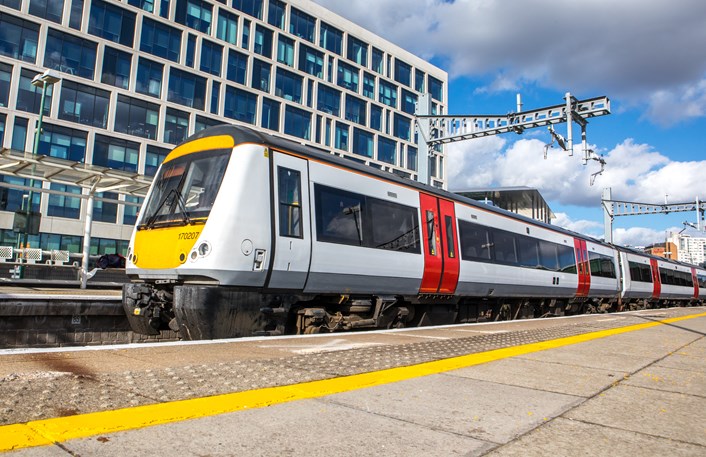- Strictly Necessary Cookies
Strictly Necessary Cookies
Some of our cookies are essential and parts of the site won't work without them. This includes recording your cookie storage preferences.
03 Oct 2019
Transport for Wales (TfW) has announced plans to provide space for up to 6,500 more commuters a week from December this year, whilst introducing additional trains right across the Wales and Borders rail network.
Improvements for rail passengers in December 2019 will include:
• Valley lines will see more four-carriage trains on peak services and combined with other rolling stock changes, will provide space for up to 6,500 more commuters every week.
• Passengers between Cheltenham and Maesteg, and between Cardiff and Ebbw Vale will have the benefit of modern Class 170 trains with more space, onboard passenger information systems, accessible toilets, air conditioning, Wi-Fi and power sockets.
• Long distance passengers on some services between North Wales and Manchester will be traveling on more modern ‘Mark 4 intercity’ carriages.
As part of the updated plan for December, Porterbrook, the supplier of the delayed Class 769s, will provide additional Class 153 trains until the previously ordered Class 769s are available for use.
Mary Grant, CEO of Porterbrook, said:
“Porterbrook is committed to working closely with TfW as they continue to transform the experience of rail passengers across Wales. Some of TfW’s plans depend on our innovative Class 769 trains, whose introduction into service has been subject to delays for which we apologise. We are actively working with TfW and our supply chain to deliver these trains as soon as possible. In the meantime, we have accelerated delivery of our Class 170 units and are also supplying additional trains to cover for the Class 769s and provide support to TfW and their passengers.”
TfW will also be improving the onboard experience for long-distance journeys with the introduction of refurbished, more accessible Mark 4 intercity carriages on certain services between North Wales and Manchester, and an additional loco-hauled service on the key Holyhead-Cardiff route linking North and South Wales.
Passenger feedback has highlighted the need to improve capacity and resilience in the fleet as a key priority, TfW plan to deliver this by keeping Pacer trains for a short period during 2020, subject to receiving a time-limited dispensation against the mandatory requirements for accessible rail vehicles which come into force on 1st January 2020. The Pacers and Class 37 loco hauled trains will gradually be removed from service as the more modern and comfortable Class 769s become available in the new year.
The popular Class 37 loco-hauled trains were temporarily added to the fleet back in May 2019 to help provide an immediate capacity boost on the busy Rhymney Valley line – again in response to demands from customers for extra seats.
James Price, Transport for Wales CEO said:
“Our customer research reveals that being able to sit or stand comfortably on a train is a top priority for many people, and therefore we hope that our customers will welcome plans which will mean a big increase in capacity for December.
“We’re also pleased that we’re improving the overall experience for passengers using services between Cheltenham and Maesteg, and between Cardiff and Ebbw Vale through the introduction of more modern accessible trains.
“Our plan is to retain some of our Pacer and Class 37 loco-hauled trains for a short period of time in 2020 to allow us to increase capacity of our busiest routes, meaning extra space onboard for our customers.
“We have always focused on delivering what our customers want, and we will do all we can to provide further capacity, which is their key priority. We must remain responsive to the needs of all of our customers, even if this means changing our plans.”
Notes to editors
Notes to editors;
Customer research from TfW has revealed that:
• Customers place a higher importance on being able to sit or stand comfortably on a train than other key priorities, such as punctuality of the service.
• Current TfW performance is below the customers’ expectation on capacity.
• There are more tweets about capacity than delay/disruption or quality of rolling stock.
• Complaints figures indicate a trend of increasing numbers of capacity-related complaints month-on-month.
• The latest wave of the NRPS as well as monthly customer satisfaction and mystery shopper surveys reflect a similar picture in overcrowding being the biggest issue (particularly for commuters).
The additional capacity will be provided through changes to the current plan, which includes operating 11 services with Class 150 trains rather than Pacers. These larger trains, which are being upgraded to improve accessibility will provide additional space in the morning and evening peaks on Treherbert, Aberdare and Merthyr services, meaning capacity for up to 1300 more customers daily, and therefore up to 6500 weekly.
Pacer trains will be focused as four carriage trains on the majority of Rhymney line services, with the Class 37 loco-hauled trains continuing to operate as the larger and more modern Class 769s are gradually introduced in the new year.
The mandatory requirement for rolling stock to meet modern accessibility standards comes in to force on 1 January 2020. Any trains which will remain in service with existing levels of accessibility is a decision for the UK Secretary of State for Transport who will consider applications for dispensation against standards from the rail industry on the merits of each case.


